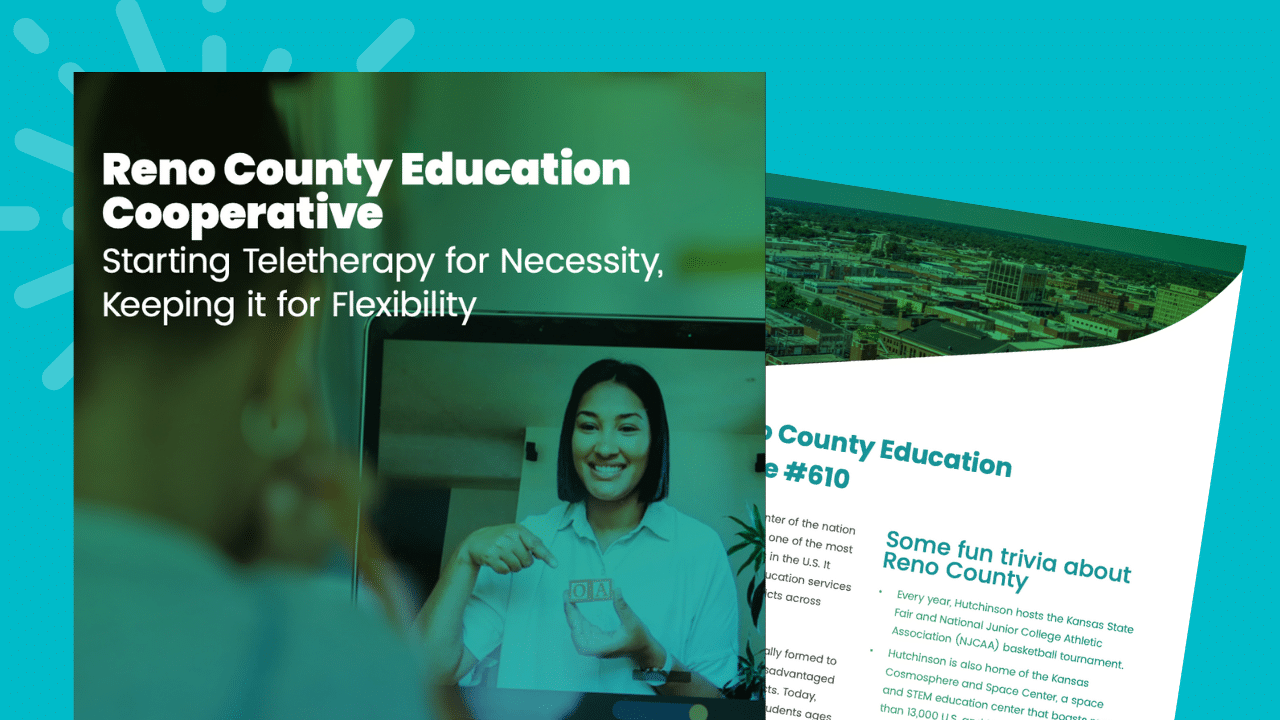Reno County Education Cooperative:
Starting Teletherapy for Necessity,
Keeping it for Flexibility
Case Study
Discover how the Reno County Education Cooperative (RCEC) in Kansas transformed its special education and student support services through eLuma’s virtual therapy solutions. This case study explores how RCEC addressed therapist shortages, ensured service continuity, and created a flexible, sustainable approach to supporting students.
About Reno County Education Cooperative (RCEC)
The Reno County Education Cooperative (RCEC) is located in Hutchinson, Kansas, and provides centralized special education services to students across five school districts. Founded in 1973, RCEC was created to ensure access to education for disadvantaged students in rural areas.
Today, RCEC serves approximately 800 students ages 3–21 and 200 infants and toddlers through a dedicated team of 100 licensed staff, 170 classified staff, and online teletherapy.
RCEC is based in a region where therapist shortages and geographic barriers make service delivery challenging. With a mission to ensure that all students receive the support they need, RCEC continuously explores innovative approaches to special education—leading them to adopt teletherapy.

Table of Contents
Before the 2019-2020 school year, RCEC relied exclusively on in-person professionals for speech, occupational, and physical therapy. However, facing a shortage of qualified providers, RCEC launched its first teletherapy pilot with eLuma in 2019, supplementing its in-person team with online therapy.
This initiative became even more critical when the COVID-19 pandemic forced schools to transition to remote learning. What started as a limited trial became an essential part of RCEC’s student services strategy.
The governor shut everything down; there was no more face-to-face teaching or special education services. Right away, we had to adapt and change everything. Our in-person therapists were using Zoom. eLuma delivered teletherapy and helped train our in-person therapists as well.”
— Lena Kisner, Executive Director of Special Education at RCEC
Building Trust and Overcoming Skepticism
When RCEC first introduced teletherapy, some schools and parents were hesitant. They worried that virtual therapy wouldn’t match the quality of in-person services. However, as teletherapy became widespread during the pandemic, perceptions quickly changed.
“Some districts and schools were a little apprehensive. They thought, ‘Are we not good enough for an in-person therapist?’”
The Impact: Engagement, Accessibility, and Student Success
The shift to teletherapy brought unexpected benefits:
- Consistent and High-Quality Support: Schools saw that virtual therapy provided the same level of care and, in some cases, improved student engagement.
- Increased Accessibility: Eliminating travel time made services more convenient for students and families.
- Better Outcomes for Some Students: Students on the autism spectrum, in particular, thrived in the structured online setting.
“The principal of one of our elementary schools came to me and requested to stay with their teletherapist.”
Why Teletherapy is Here to Stay
RCEC’s experience reflects a broader trend in rural education: the growing demand for flexible, high-quality therapy services. Across the U.S., over 7 million students (14%) receive special education services, but rural schools often struggle to find enough qualified therapists.
Teletherapy helps bridge this gap, offering:
- A sustainable solution to therapist shortages
- Seamless integration with in-person services
- More options to match students with the right specialists
As RCEC continues to evolve, teletherapy remains a permanent fixture in its commitment to delivering exceptional special education services.
“I think we’ll always have teletherapy as part of our mix. There’s definite value. Not all kids learn by the same modality, and the same is true for therapy and counseling. When you have someone to partner with, like eLuma, it makes it easier.”




